Heat Pump Hot Water Heaters
Heat pump hot water systems have come a long way in recent years, overcoming a rocky start in Australia that left many people hesitant to try them. However, these systems offer an incredibly affordable option, with potential energy savings of up to 75% when compared to electric or LPG gas systems. In some cases, they can even be cheaper than solar systems when factoring in both upfront costs and running costs over the lifespan of the unit.
It’s important to keep in mind that, as with any product, you get what you pay for when it comes to heat pump systems. Choosing a no-name, cheap option may save you money upfront, but it often comes at the cost of inferior parts and construction. In contrast, investing in a reputable brand can provide you with reliable and long-lasting hot water heating that will continue to save you money on your energy bills for years to come. Don’t let a rocky start deter you from considering the many benefits of a high-quality heat pump hot water system.
Despite their potential for energy savings, heat pump hot water systems in Australia had a difficult start, with many major brands producing products that were unreliable and inefficient from the mid to late 2000s until around 2015. This was in part due to the government’s push for solar and heat pump rebates for those switching from electric water heaters, as well as new regulations mandating that new homes could only have solar, gas, or heat pump hot water systems. As a result, manufacturers rushed to design and produce heat pumps without fully considering the practical implications of their decisions. This resulted in many poorly designed and manufactured products that did not meet customer expectations. However, as technology and engineering have improved in recent years, modern heat pump systems have become more reliable and cost-effective, offering a real alternative to traditional hot water systems.
Unfortunately, there are still some substandard heat pump systems being sold to unsuspecting consumers by sales companies that prioritise sales over quality. Some of these cheaper, no-name Chinese and other imported heat pumps simply do not withstand the Australian climate due to the materials they are made from.
However, if you are a savvy consumer, you would understand that a cheaper product generally means it is made from cheaper components. While the cost difference between a no-name heat pump water heater and a reputable brand is not significant, the electricity savings are enormous if you switch from a gas or electric water heater to a heat pump when it’s time for a new hot water service.
To get unbiased and honest advice on what’s good and what’s not, call us at 1300728122.
Now, let’s delve into how heat pumps work and the different heating styles available. The easiest way to understand how a heat pump works is to compare it to a refrigerator, which cools and expels hot air. Similarly, a heat pump heats and expels colder air. When an air conditioner is running, it blows out hot air. In contrast, a heat pump water heater blows out cold air and uses the hot air to heat water through heating plates and pipes that wrap around or are inside the water storage tank. A heat pump uses only 1kW of power compared to an electric system, which uses 4kW, resulting in a whopping 75% power reduction.
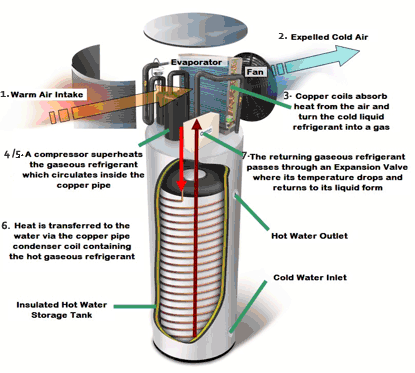
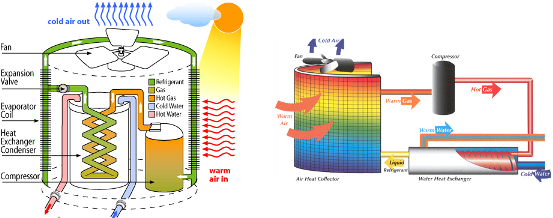
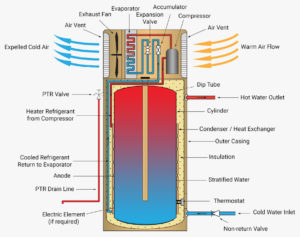
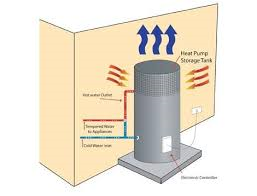
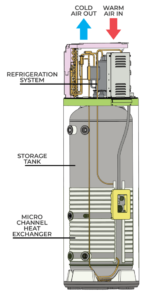

Heat pump hot water heaters are an energy-efficient alternative to conventional electric water heaters. They work by absorbing heat from the air and transferring it to the water, which is why they are also known as ‘air-sourced solar hot water heaters’. Compared to standard electric water heaters, they are roughly three times more efficient and consume less power, generally around 1 kW as opposed to 3.6 kW in a conventional electric water heater. This makes them a cost-effective and environmentally friendly option, especially when paired with solar PV systems. By using heat from the air instead of electricity, heat pump hot water heaters save energy, money, and reduce greenhouse gas emissions.
How does a Heat Pump work?
A heat pump operates on the same basic principle as an air conditioner or refrigerator. Instead of cooling, it pumps heat from the surrounding air and transfers it to the water to heat it up. This process is achieved by using a refrigerant to absorb heat from the air and transfer it to the water through a heat exchanger or pipes submerged or wrapped around the storage tank. Some models also use heating plates to transfer heat from the refrigerant to the water. The refrigerant absorbs heat from the air and then evaporates at low temperatures. The evaporated refrigerant is then compressed, which increases its temperature and pressure, and it releases the absorbed heat into the water. This continuous cycle ensures that the water is constantly heated, providing a reliable and energy-efficient hot water solution for your home.
There are several steps in the process:
This is a basic explanation of how a heat pump operates to heat water. It follows the four basic steps of a heat pump cycle: evaporation, compression, condensation, and expansion. During the evaporation process, the liquid refrigerant absorbs heat from the air, causing it to vaporize into a gas. This gas is then compressed by the electric compressor, which raises its temperature to a point where it is hotter than the water in the tank. The hot gas is then passed through a condenser, where it releases its heat to the water and returns to a liquid state. Finally, the liquid refrigerant flows through an expansion valve, which reduces its pressure, allowing it to cool and evaporate, thus restarting the cycle.
A heat pump uses electricity to drive the compressor and the fan instead, unlike a traditional electric resistance water heater that uses electricity to directly heat the water. The heat pump is able to transfer a much greater amount of heat energy from the surrounding air to the water, which makes it highly efficient. The amount of heat that is able to be transferred from the air to water depends on the ambient temperature.
While the outside “ambient” temperature is higher than the cold refrigerant gas, the heat pump will absorb heat and move it to the water. The warmer the outside temperature, the easier and more efficient it is for the heat pump to provide hot water. As the outside temperature decreases, less heat can be transferred, which is why heat pumps don’t work as well in places where temperatures are low. A few heat pump manufacturers now make systems that work down in the negative temperatures which means some may be installed internally where there is enough space, the size of a large garage with some ventilation.
In order for the evaporator to allow heat to be absorbed continuously, there needs to be a constant supply of fresh air. A fan is used to force air flow through and the colder air is removed to the atmosphere
Heat pump water heaters are available in two different styles
- Integrated or compact design where the compressor and the storage tank are a single complete system
- Split systems: the tank and the compressor are 2 separate items, like a split air conditioner, where the storage tank is connected to the heat pump component by refrigerate pipes
There are a lot of benefits in choosing a Heat Pump Hot Water Heater, environmentally and financially
Want more information about these types of hot water heaters?
Give us a call today at 1300 728 122 or after hours and weekends on 0413 861 166. We are a family owned and operated business and we pride ourselves on expert knowledge and advice from technical people who have worked in the industry for over 20 years exclusively in this hot water-only company. We are trusted by most of the hot water makers in Australia to carry out their service and warranty work. General everyday maintenance plumbers and electricians are known for giving unauthentic advice about different types of water heaters because they just simply do not understand how they work.
We don’t do blocked drains or guttering we only do hot water.